Navigating childcare background check requirements across 50 states presents one of the most challenging compliance hurdles for childcare administrators. Each state uses unique fingerprinting procedures, clearance timelines, and staff categorizations beyond federal minimums. This guide decodes the complex patchwork of state childcare background check laws. It provides actionable compliance frameworks that address licensing requirements, employee versus volunteer distinctions, and state-specific screening protocols. These tools help childcare centers maintain regulatory adherence while protecting the children in their care.
Key Takeaways
- All childcare facilities must comply with federal baseline requirements including FBI fingerprint checks and searches of national crime databases, sex offender registries, and child abuse registries across all states where applicants have resided.
- State childcare background check laws vary significantly in scope, with some states requiring additional state-level clearances, registry checks, and renewed screenings at intervals ranging from annual reviews to five-year cycles.
- Childcare licensing background check timelines differ substantially by state, with processing periods ranging from 48 hours to 12 weeks depending on fingerprinting methods and state agency capacity.
- Preschool background check compliance requires understanding distinctions between employees, contractors, volunteers, and household members, as states apply different screening standards to each category.
- Childcare fingerprinting requirements by state include both traditional ink-and-roll methods and electronic Live Scan systems, with costs ranging from $25 to $150 per screening depending on state fee structures.
- Disqualifying offenses extend beyond convictions to include pending charges, substantiated child abuse findings, and placement on sex offender registries, though 23 states now offer rehabilitation waiver processes.
- Conditional hiring practices allow applicants to begin supervised work after state clearances while awaiting FBI results in 37 states, though specific protocols and supervision ratios vary.
- Non-compliance penalties include immediate license revocation, civil fines up to $10,000 per violation, and potential criminal charges for knowingly employing disqualified individuals.
Understanding Federal Childcare Background Check Requirements
The Child Care and Development Block Grant (CCDBG) Act of 2014 established baseline standards. All states must meet these standards when conducting background screenings for childcare providers. These federal requirements create the foundation upon which states build their individual regulatory frameworks. As a result, they ensure a minimum level of protection for children across all jurisdictions. States must check FBI criminal history databases, the National Sex Offender Registry, state criminal repositories, state sex offender registries, and state child abuse and neglect registries for every applicant.
The federal mandate extends beyond employees. It also includes volunteers who have unsupervised access to children, contractors with direct child contact, and any adult residing in family childcare homes. Background checks must be completed before final employment decisions. However, states may use conditional hiring procedures with specific safeguards.
It’s a given that when we speak of background checks in childcare, what we’re ultimately referring to is whom we elect to trust with our most precious family members. I’ve found through the years that it is never simply a question of marking a governmental requirement checkbox—it is, instead, a matter of looking a parent in the eye with the utmost confidence in saying, “We have done everything in our power to ensure the safety of your child.” As HR professionals, we are bearing this burden in a balancing act that weighs personnel needs, budget constraints, and state regulations in equal measure with this one, absolute determinant: Children Always Come First. By creating a process of screening that respects this mandate, we’re not simply filling a chair—we’re safeguarding a future that comes with a trust that money simply can’t purchase.
Covered Individuals Under Federal Law
Federal regulations define covered individuals broadly to ensure full protection for children in care settings. The CCDBG Act requires background checks for all staff members who have direct contact with children. In addition, it covers those with unsupervised access to spaces where children are present. As a result, the mandate extends beyond classroom teachers to a wide range of personnel who interact with childcare environments.
Covered individual categories include:
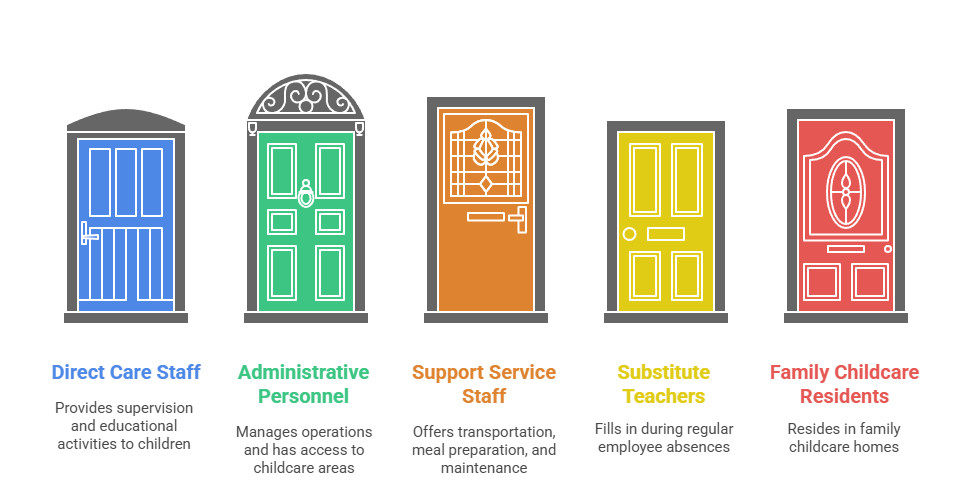
- Direct Care Staff: Teachers, assistant teachers, classroom aides, and floater staff who provide supervision and educational activities to children
- Administrative Personnel: Directors, assistant directors, and office staff who have access to childcare areas during operational hours
- Support Service Staff: Transportation providers, meal preparation staff working during childcare hours, and maintenance workers with facility access when children are present
- Substitute Teachers: Relief workers, substitute educators, and temporary staff who fill in during regular employee absences
- Family Childcare Residents: Any adult residing in family childcare homes regardless of their involvement in childcare operations
States maintain flexibility in determining how to categorize occasional volunteers. However, any individual who could potentially be alone with children must undergo the full federal screening protocol. This eliminates loopholes that could compromise child safety.
Components of Federal Background Screenings
The federal background check comprises seven distinct searches. These searches together provide multiple perspectives on an applicant's history. These layered searches create redundancy that catches records potentially missed by single-source checks. As a result, they significantly strengthen child protection protocols.
Required federal screening components include:
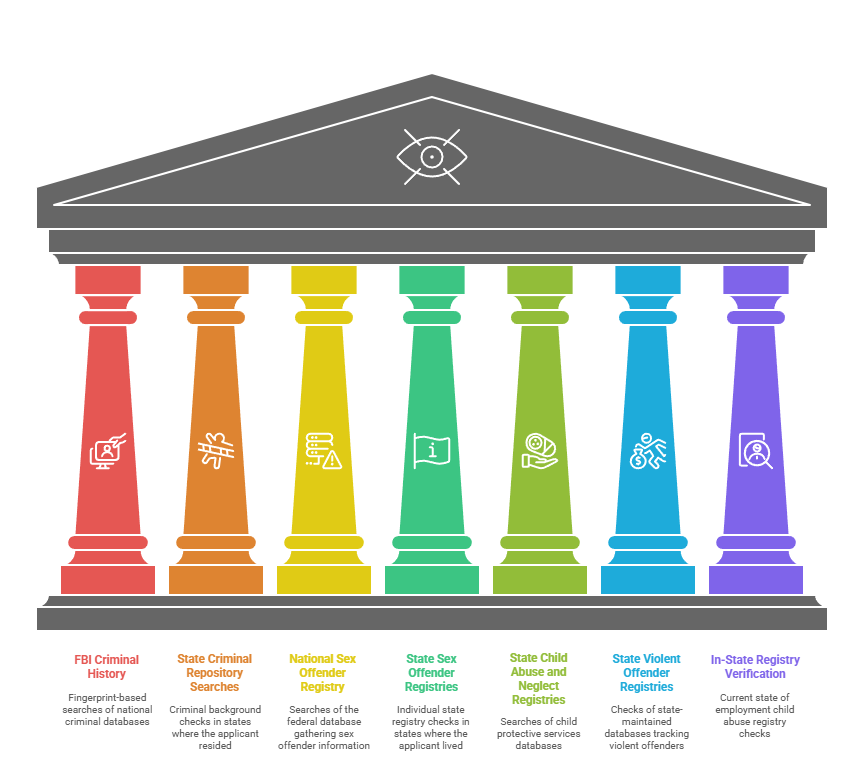
- FBI Criminal History: Fingerprint-based searches of national criminal databases covering the applicant's complete adult history across all U.S. jurisdictions
- State Criminal Repository Searches: Criminal background checks in all states where the applicant resided during the previous five years
- National Sex Offender Registry (NSOR): Searches of the federal database gathering sex offender information from all 50 states
- State Sex Offender Registries: Individual state registry checks in all states where the applicant lived, worked, or attended school during the five-year lookback period
- State Child Abuse and Neglect Registries: Searches of child protective services databases documenting substantiated maltreatment findings in all relevant states
- State Violent Offender Registries: Checks of state-maintained databases tracking individuals convicted of violent crimes
- In-State Registry Verification: Current state of employment child abuse registry checks and any additional state-specific protection databases
The lookback period extends to the applicant's entire adult history for most offenses. Nevertheless, states may establish rehabilitation pathways for certain older convictions.
State Comparison Matrix for Childcare Background Check Requirements
This matrix provides quick-reference guidance on key background check elements across all 50 states. Therefore, it helps administrators identify their specific compliance obligations. Requirements reflect current regulations as of 2025. However, administrators should verify details with state licensing agencies as regulations undergo frequent updates.
Western States Background Check Requirements
Western states show considerable variation in their background check requirements. Processing times range from the fastest in the nation to more extended periods. Registry requirements and volunteer protocols also differ significantly across this region.
| State | Fingerprinting Required | FBI Check Timeline | State Registry Checks | Volunteer Requirements | Renewal Period | Waivers Available |
| Alaska | Yes - Electronic | 4-6 weeks | 2 registries | Same as employees | 3 years | Yes |
| Arizona | Yes - Live Scan | 1-3 weeks | 4 registries | Modified for supervised | 6 years | Yes |
| California | Yes - Live Scan | 3-5 days | 5 registries | Same as employees | 5 years | Limited |
| Colorado | Yes - Electronic | 2-4 weeks | 3 registries | Same as employees | 5 years | Yes |
| Hawaii | Yes - Electronic | 6-8 weeks | 3 registries | Same as employees | 5 years | Yes |
| Idaho | Yes - Both accepted | 3-4 weeks | 2 registries | Modified for supervised | 5 years | Yes |
| Montana | Yes - Both accepted | 4-6 weeks | 2 registries | Modified for supervised | 5 years | Yes |
| Nevada | Yes - Live Scan | 2-3 weeks | 3 registries | Same as employees | 5 years | Limited |
| New Mexico | Yes - Electronic | 3-4 weeks | 2 registries | Same as employees | 5 years | Yes |
| Oregon | Yes - Electronic | 3-5 weeks | 4 registries | Same as employees | 5 years | Yes |
| Utah | Yes - Electronic | 2-3 weeks | 3 registries | Same as employees | 5 years | Yes |
| Washington | Yes - Electronic | 2-4 weeks | 4 registries | Same as employees | 3 years | Yes |
| Wyoming | Yes - Both accepted | 3-4 weeks | 2 registries | Modified for supervised | 5 years | Yes |
California leads the nation with the fastest processing times at 3-5 days. Meanwhile, Hawaii has among the longest timelines at 6-8 weeks. Arizona offers one of the longest renewal periods at 6 years.
Southern States Background Check Requirements
Southern states demonstrate significant diversity in their background check protocols. Some states have among the most streamlined processes in the nation. Others maintain more complex requirements with multiple registry checks.
| State | Fingerprinting Required | FBI Check Timeline | State Registry Checks | Volunteer Requirements | Renewal Period | Waivers Available |
| Alabama | Yes - Live Scan | 2-4 weeks | 3 registries | Same as employees | 5 years | Limited |
| Arkansas | Yes - Both accepted | 3-5 weeks | 3 registries | Same as employees | 5 years | No |
| Delaware | Yes - Electronic | 2-3 weeks | 2 registries | Same as employees | 5 years | Limited |
| Florida | Yes - Live Scan | 5-7 days | 4 registries | Modified for supervised | 5 years | No |
| Georgia | Yes - Live Scan | 1-2 weeks | 3 registries | Same as employees | 5 years | Limited |
| Kentucky | Yes - Live Scan | 2-3 weeks | 3 registries | Same as employees | 5 years | No |
| Louisiana | Yes - Electronic | 3-5 weeks | 4 registries | Same as employees | 5 years | Limited |
| Maryland | Yes - Electronic | 3-4 weeks | 4 registries | Same as employees | 5 years | Yes |
| Mississippi | Yes - Both accepted | 3-4 weeks | 2 registries | Same as employees | 5 years | No |
| North Carolina | Yes - Electronic | 3-5 weeks | 4 registries | Same as employees | 5 years | Limited |
| Oklahoma | Yes - Both accepted | 2-4 weeks | 3 registries | Same as employees | 5 years | Limited |
| South Carolina | Yes - Electronic | 2-3 weeks | 3 registries | Same as employees | 5 years | No |
| Tennessee | Yes - Electronic | 2-4 weeks | 3 registries | Same as employees | 5 years | Limited |
| Texas | Yes - Both accepted | 2-3 weeks | 4 registries | Modified for supervised | 5 years | Yes |
| Virginia | Yes - Electronic | 3-4 weeks | 4 registries | Same as employees | 5 years | Limited |
| West Virginia | Yes - Both accepted | 3-5 weeks | 2 registries | Same as employees | 5 years | Limited |
Georgia features some of the fastest processing at 1-2 weeks. Florida also processes quickly at 5-7 days. Several southern states do not offer waiver programs.
Midwestern States Background Check Requirements
Midwestern states generally maintain moderate processing times and registry requirements. Several states in this region have adopted shorter renewal cycles. This requires more frequent rescreening of childcare workers.
| State | Fingerprinting Required | FBI Check Timeline | State Registry Checks | Volunteer Requirements | Renewal Period | Waivers Available |
| Illinois | Yes - Digital | 2-4 weeks | 4 registries | Same as employees | 3 years | Limited |
| Indiana | Yes - Electronic | 2-3 weeks | 3 registries | Same as employees | 5 years | Yes |
| Iowa | Yes - Both accepted | 3-5 weeks | 3 registries | Modified for supervised | 5 years | Yes |
| Kansas | Yes - Electronic | 2-4 weeks | 2 registries | Same as employees | 3 years | Limited |
| Michigan | Yes - Electronic | 2-4 weeks | 3 registries | Same as employees | 3 years | Yes |
| Minnesota | Yes - Electronic | 3-5 weeks | 4 registries | Same as employees | 5 years | Yes |
| Missouri | Yes - Electronic | 2-3 weeks | 3 registries | Modified for supervised | 5 years | Limited |
| Nebraska | Yes - Electronic | 2-4 weeks | 3 registries | Same as employees | 5 years | Yes |
| North Dakota | Yes - Both accepted | 3-4 weeks | 2 registries | Modified for supervised | 5 years | Yes |
| Ohio | Yes - Electronic | 2-3 weeks | 3 registries | Same as employees | 5 years | Yes |
| South Dakota | Yes - Both accepted | 3-5 weeks | 2 registries | Modified for supervised | 5 years | Yes |
| Wisconsin | Yes - Electronic | 2-3 weeks | 3 registries | Modified for supervised | 4 years | Yes |
Illinois, Kansas, and Michigan require more frequent renewals at 3-year intervals. Wisconsin uses a unique 4-year renewal cycle. Most midwestern states offer waiver programs.
Northeastern States Background Check Requirements
Northeastern states generally require more registry checks and longer processing timelines. This region tends to apply the most stringent background check requirements. Several states mandate five or more registry searches.
| State | Fingerprinting Required | FBI Check Timeline | State Registry Checks | Volunteer Requirements | Renewal Period | Waivers Available |
| Connecticut | Yes - Live Scan | 4-8 weeks | 4 registries | Same as employees | 5 years | Yes |
| Maine | Yes - Both accepted | 4-6 weeks | 3 registries | Modified for supervised | 5 years | Yes |
| Massachusetts | Yes - Live Scan | 6-10 weeks | 5 registries | Same as employees | 3 years | Limited |
| New Hampshire | Yes - Electronic | 3-5 weeks | 3 registries | Modified for supervised | 5 years | Yes |
| New Jersey | Yes - Live Scan | 6-8 weeks | 5 registries | Same as employees | 5 years | Limited |
| New York | Yes - Live Scan | 8-10 weeks | 5 registries | Same as employees | 5 years | No |
| Pennsylvania | Yes - Electronic | 4-6 weeks | 4 registries | Same as employees | 5 years | Limited |
| Rhode Island | Yes - Live Scan | 4-6 weeks | 3 registries | Same as employees | 5 years | Yes |
| Vermont | Yes - Electronic | 4-6 weeks | 3 registries | Same as employees | 5 years | Yes |
New York has the longest processing time at 8-10 weeks. Massachusetts, New Jersey, and New York all require five registry checks. Massachusetts requires the most frequent renewals at 3-year intervals.
Understanding Registry Check Requirements by State
State registry checks extend background screening beyond criminal conviction records. They identify individuals with documented child protection concerns who may not have criminal histories. All states maintain child abuse and neglect registries. These registries document substantiated maltreatment findings from CPS investigations. In addition, states maintain sex offender registries. In fact, 48 states require checks of both in-state and national sex offender databases.
The number and type of registries checked varies significantly across states. Basic screening states conduct 2-3 registry searches. These cover sex offenders and child abuse/neglect. In contrast, thorough screening states check 4-5 or more registries. These may include vulnerable adult abuse registries, healthcare sanctions databases, and professional discipline records.
The State Regulatory Landscape for Daycare Employee Background Screening
State childcare background check laws create a complex compliance environment. Requirements can differ dramatically across state lines. While federal standards establish the floor, states add extra screenings. They also impose stricter disqualification criteria, mandate more frequent renewals, and establish unique procedural requirements.
Some states require annual fingerprint renewals. Others accept five-year clearances. Certain jurisdictions mandate additional health screenings, tuberculosis tests, or professional reference checks. Progressive states have begun using continuous monitoring systems. These systems alert childcare facilities to any arrests or convictions occurring after initial clearance.
Enhanced State Requirements Beyond Federal Minimums
Many states impose extra background checks that exceed federal baseline requirements. Enhanced screenings may include state-specific registry checks. Examples include vulnerable adult abuse registries, healthcare sanctions databases, or professional discipline records. Twelve states require applicants to submit fingerprints to both state police and FBI databases separately. This creates dual-track clearance processes with independent timelines.
State enhancement categories include expanded lookback periods and additional registry checks. They also include health and safety screenings such as tuberculosis testing. Character references with independent verification calls are common as well. These enhanced requirements create additional compliance touchpoints that administrators must track throughout the hiring process.
State-Specific Disqualification Standards
While federal law identifies categories of disqualifying crimes, states exercise significant discretion. They define which specific offenses permanently bar childcare employment. States vary dramatically in their treatment of different offense types. They also vary in rehabilitation opportunities and handling of pending charges.
Universal and variable disqualification categories include:
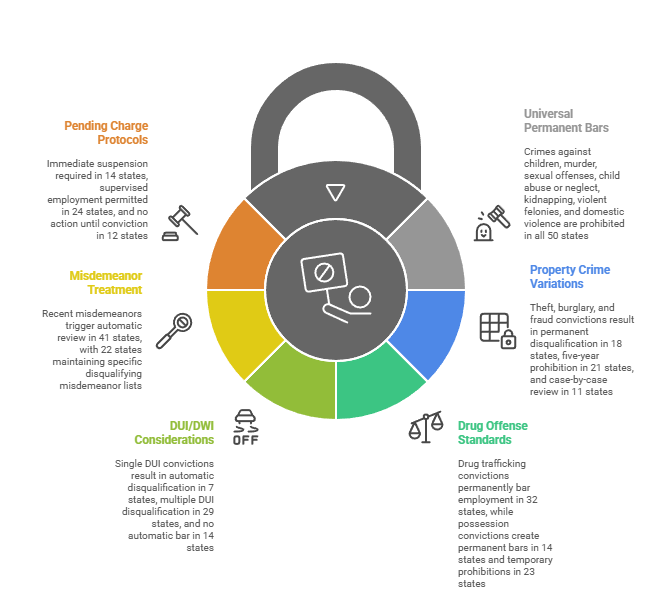
- Universal Permanent Bars: Crimes against children, murder, sexual offenses, child abuse or neglect, kidnapping, violent felonies, and domestic violence are prohibited in all 50 states
- Property Crime Variations: Theft, burglary, and fraud convictions result in permanent disqualification in 18 states, five-year prohibition in 21 states, and case-by-case review in 11 states
- Drug Offense Standards: Drug trafficking convictions permanently bar employment in 32 states, while possession convictions create permanent bars in 14 states and temporary prohibitions in 23 states
- DUI/DWI Considerations: Single DUI convictions result in automatic disqualification in 7 states, multiple DUI disqualification in 29 states, and no automatic bar in 14 states
- Misdemeanor Treatment: Recent misdemeanors trigger automatic review in 41 states, with 22 states maintaining specific disqualifying misdemeanor lists
- Pending Charge Protocols: Immediate suspension required in 14 states, supervised employment permitted in 24 states, and no action until conviction in 12 states
Twenty-nine states maintain lifetime prohibition lists. These permanently disqualify individuals with certain convictions regardless of rehabilitation evidence. On the other hand, 23 states have put in place rehabilitation review processes. These allow applicants to petition for waivers after specified periods.
Comprehensive State-by-State Childcare Fingerprinting Requirements
Childcare fingerprinting requirements by state include both the technical method of fingerprint collection and the later database searches. Most states have transitioned to electronic Live Scan fingerprinting systems. These systems capture digital prints and transmit them directly to state and federal databases. As a result, they significantly reduce processing times compared to traditional ink-based methods.
The fingerprinting process serves as the gateway to FBI criminal history checks. It also provides access to state criminal repository searches. Therefore, it's the most critical component of thorough background screenings. Processing timelines vary from 48 hours for electronic submissions to 12 weeks for ink cards during peak hiring seasons.
Live Scan vs. Traditional Fingerprinting Methods
Live Scan electronic fingerprinting and traditional ink fingerprint cards represent two distinct approaches. Each has specific advantages, limitations, and processing characteristics. Understanding the differences helps administrators select appropriate fingerprinting options.
| Feature | Live Scan Electronic Fingerprinting | Traditional Ink Fingerprint Cards |
| Processing Speed | 48 hours to 3 weeks; direct electronic submission eliminates mailing delays | 3-12 weeks; manual processing and physical card handling add substantial time |
| Accuracy & Rejection Rate | 5-8% rejection rate due to real-time quality verification | 15-25% rejection rate requiring complete resubmission |
| Geographic Availability | Available in metropolitan areas; 37 states have extensive Live Scan networks | Available everywhere including rural areas |
| Cost Range | $35-$75 for fingerprinting plus $15-$50 state processing fees | $15-$35 for fingerprinting plus $15-$50 state fees plus postage |
| Database Integration | Direct connection to state identification bureaus and FBI | Manual entry required; cards may be lost or delayed |
| Convenience Factor | Requires travel to specific authorized locations | Flexible options including mobile fingerprinting services |
Live Scan electronic fingerprinting has become the preferred method in 37 states. Mobile fingerprinting services have emerged as a solution for childcare facilities in underserved areas. However, these services typically cost 20-30% more than fixed-location fingerprinting.
Expedited Processing Options and Emergency Procedures
Twenty-eight states offer expedited fingerprint processing for childcare facilities. These services typically reduce processing times by 50-75% through priority queue placement. Expedite fees range from $25 to $75 above standard processing costs.
Emergency hiring provisions exist in 19 states. These allow facilities to employ applicants under direct supervision while awaiting complete background clearances. These conditional employment protocols require documented supervision plans. They also mandate restricted duties prohibiting solo child interaction.
Preschool Background Check Compliance for Licensed Centers

Preschool background check compliance intersects childcare regulations with early childhood education requirements. This creates layered screening obligations for facilities offering educational programming. Twenty-six states classify preschool programs differently from traditional childcare. As a result, they impose additional background checks related to educational credentials and professional conduct records.
Key compliance considerations for preschool programs include:
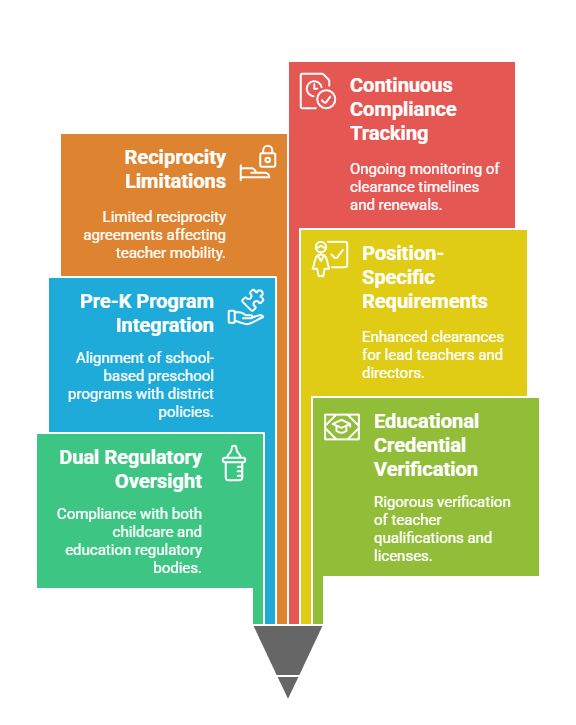
- Dual Regulatory Oversight: Licensed preschool centers often operate under both childcare licensing agencies and education departments
- Educational Credential Verification: Enhanced screening protocols for preschool teachers including verification of degrees and professional teaching licenses
- Pre-K Program Integration: School-based preschool programs follow district background check policies that may differ from private childcare requirements
- Position-Specific Requirements: Fourteen states impose enhanced clearances for lead teachers or directors
- Reciprocity Limitations: Some states have put in place reciprocity agreements, though such agreements remain limited
- Continuous Compliance Tracking: Administrators must track separate clearance timelines and renewal schedules for each regulatory authority
Understanding these layered requirements helps preschool administrators navigate the complex intersection of regulations. Facilities should maintain detailed tracking systems documenting which regulatory body requires each specific screening component.
Head Teachers vs. Assistant Staff Requirements
Most states apply identical background screening requirements to all staff categories with direct child contact. However, 14 states impose enhanced clearances for lead teachers or directors. Understanding which states differentiate screening requirements by position helps administrators allocate compliance resources appropriately.
| Aspect | Head Teachers/Directors | Assistant Teachers/Classroom Aides |
| Standard Clearances | All federal requirements: FBI fingerprints, criminal history, sex offender registries, child abuse registries | Identical federal requirements: FBI fingerprints, criminal history, sex offender registries, child abuse registries |
| Additional Requirements | Enhanced requirements in 14 states: Professional reference checks, educational credential verification, professional license background reviews | No additional requirements beyond standard screenings in 36 states |
| Authority Level | Independent authority over classroom operations; may be alone with children | Must maintain sight-and-sound supervision by lead teacher |
| Disqualification Standards | Subject to strictest interpretation; rehabilitation waivers rarely granted | Identical offense categories but some flexibility in waiver consideration |
| Renewal & Monitoring | Priority for continuous monitoring; shorter renewal cycles in 8 states | Standard renewal timelines; continuous monitoring at facility discretion |
This tiered approach allows states to focus more intensive scrutiny on positions with greater responsibility. Facilities must carefully document each employee's classification. They must also ensure all applicable screenings are completed before assignment to role-appropriate duties.
Substitute and Relief Staff Background Clearances
All states require substitute staff to complete identical background clearances as regular employees. However, 18 states have put in place centralized substitute clearance registries. These allow approved substitutes to work at any licensed facility statewide without duplicative screenings.
Centralized registry systems require substitutes to undergo thorough background checks administered by state licensing agencies. Upon clearance, substitutes receive state-issued credentials valid at all participating childcare centers.
Volunteer and Contractor Background Screening Requirements
Volunteer background check requirements vary dramatically by state. This variation is based on definitions of "unsupervised access" and distinctions between occasional volunteers and regular unpaid staff. Federal law requires full background screenings for volunteers with unsupervised access. However, states define "unsupervised" differently. Thirty-two states mandate identical background checks for all volunteers. This reflects a zero-risk tolerance approach to child protection.
The economic impact of volunteer screening requirements is substantial. Full background clearances costing $50-$100 per volunteer can prohibit parent participation. They may also discourage retired educators from offering unpaid enrichment activities.
Parent Volunteer Screening Protocols
Parent volunteers present particularly complex scenarios. Facilities must balance child protection standards against family engagement priorities. Twenty-three states exempt parents from background check requirements when volunteering exclusively with their own child's classroom under continuous teacher supervision.
However, exemptions disappear when parent volunteers will have contact with other children. Nine states prohibit any parent volunteer exemptions. They require full background clearances for every adult present during operational hours.
Third-Party Contractor and Vendor Clearance Requirements
All states require full background clearances for contracted teaching staff. They also require them for therapists providing services to enrolled children and transportation contractors with direct child contact. Requirements become less consistent for maintenance workers and food service contractors.
Fourteen states exempt contractors present under continuous staff supervision for limited-duration service calls. Facilities often negotiate background check responsibilities in contractor agreements. This determines whether the childcare center will conduct screenings or whether contractors must provide current clearance documentation.
Implementing Compliant Background Check Processes
Successful execution of childcare licensing background check protocols requires systematic procedures. These ensure complete screening of all covered individuals while meeting state timeline requirements. Effective compliance programs integrate background checks throughout the entire employment lifecycle.
Essential compliance program components include:
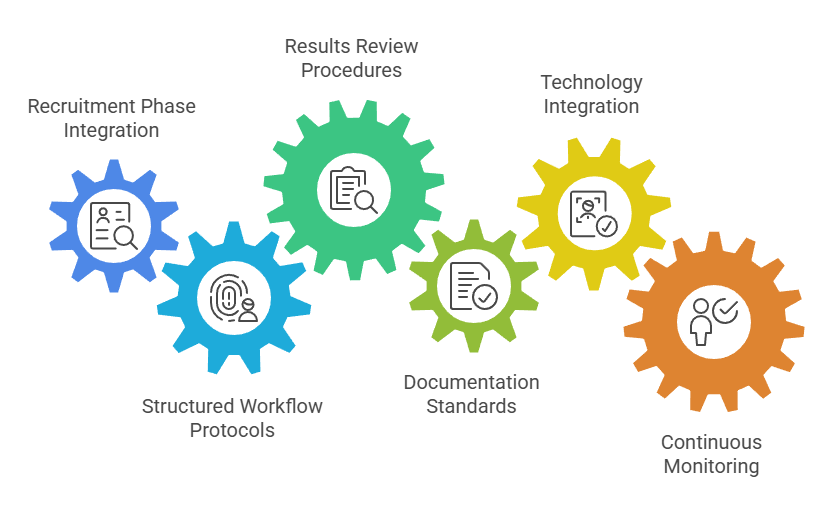
- Recruitment Phase Integration: Job postings clearly notifying applicants of background check requirements
- Structured Workflow Protocols: Clear responsibility assignments and submission of fingerprints within 5 business days
- Results Review Procedures: Documented review procedures when results return with criminal history
- Documentation Standards: Formal clearance letters placed in personnel files before unsupervised child access begins
- Technology Integration: Applicant tracking systems with integrated background check ordering
- Continuous Monitoring: Enrollment in state continuous monitoring programs where available
Even small childcare centers benefit from basic spreadsheet tracking systems. The investment in systematic tracking prevents costly compliance failures.
Conditional Hiring and Provisional Employment Policies
Thirty-seven states permit conditional employment if state-level clearances are complete. Common restrictions include continuous direct supervision by fully-cleared staff members. They also include prohibition from being alone with children under any circumstances.
Putting in place conditional hiring requires clear written policies. These must specify which clearances must be complete before conditional employment begins. Licensing violations related to improper supervision of provisional employees rank among the most common compliance failures.
Record Retention and Renewal Management
Background check documentation must be retained throughout employment. Retention requirements range from 3 to 7 years post-employment depending on state regulations. Personnel files should include copies of all clearance letters received.
Creating a master tracking calendar with renewal alerts prevents lapses in clearance status. Thirteen states have put in place continuous monitoring programs. These provide real-time alerts when cleared employees are later arrested.
Background Check Costs and Budgeting Considerations
Complete background check costs per employee range from $75 to $200. This depends on state fee structures, fingerprinting methods, and the number of registry checks required. High-cost states like New York impose substantial workforce expenses. Meanwhile, lower-cost states like Georgia create more manageable financial burdens.
Beyond direct screening fees, facilities incur indirect costs. State fee structures include fingerprinting collection fees, state criminal history check fees, and FBI fingerprint processing fees.
Cost-Reduction Strategies for Childcare Providers
Despite significant screening expenses, childcare providers can use strategies to manage background check costs. Strategic cost management balances protective screening practices with operational realities. It ensures that financial considerations never compromise child safety standards.
Effective cost-reduction approaches include:
- Volume Discount Programs: Commercial background screening vendors provide reduced per-check fees for facilities committing to minimum screening volumes
- Grant and Subsidy Programs: State and federal grant programs occasionally subsidize background screening costs; thirteen states currently offer screening cost subsidies
- Targeted Recruitment: Focus hiring on candidates with recent clearances from other childcare facilities
- Retention Initiatives: Put in place workplace culture improvements that reduce turnover
- Volunteer Management: Utilize careful volunteer screening tiers that apply thorough checks only to volunteers requiring them
- Internal Mobility: Promote from within to fill positions without new hires requiring additional screenings
Facilities should never defer required background checks. They should also never allow employees to begin work before clearances are complete outside proper conditional employment protocols.
Conclusion
Navigating childcare background check requirements demands careful attention to both federal baseline standards and state-specific specifications. Administrators who put in place systematic compliance processes position their facilities for both licensing success and optimal child protection outcomes. As states continue refining background check requirements, childcare providers must remain adaptive. At the same time, they must maintain thorough screening practices that keep children safe.
Frequently Asked Questions
How long does a childcare background check take to complete?
Background check processing times vary by state and fingerprinting method. They range from 48 hours for electronic Live Scan submissions to 12 weeks for ink fingerprint cards during peak periods. Most states complete thorough screenings within 2-4 weeks when using electronic fingerprinting systems. Expedited processing options available in 28 states can reduce timelines by 50-75% for additional fees.
Do background check requirements differ for volunteers versus employees in childcare settings?
Federal law requires identical thorough background screenings for volunteers who have unsupervised access to children. However, state executions vary significantly. Thirty-two states mandate the same complete background checks for all volunteers regardless of supervision or frequency. Meanwhile, 18 states offer tiered systems with modified screenings for closely supervised occasional volunteers. The definition of "unsupervised access" differs across states.
What criminal convictions permanently disqualify someone from childcare employment?
All states prohibit individuals convicted of crimes against children, murder, sexual offenses, child abuse or neglect, kidnapping, violent felonies, and domestic violence from working in childcare settings. However, states vary significantly in treatment of drug offenses, property crimes, DUI convictions, and older misdemeanor records. Twenty-nine states maintain lifetime prohibition lists. On the other hand, 23 states offer waiver processes allowing applicants to petition for clearance after specified periods.
Can childcare facilities charge employees for background check costs?
State laws vary regarding who bears background screening expenses. Twenty-three states prohibit employers from passing any screening costs to applicants or employees. Eighteen states explicitly permit employers to require applicants to pay for background checks. However, many facilities choose to cover costs to remain competitive in recruiting. Nine states allow cost-sharing arrangements where employers and employees split expenses.
What happens if a current employee is arrested after passing initial background checks?
Seventeen states have put in place continuous monitoring systems. These automatically alert childcare facilities when cleared employees are later arrested or convicted. In states without continuous monitoring, employers may learn of arrests through required periodic background check renewals. Upon learning of arrests for potentially disqualifying offenses, 14 states require immediate employee suspension pending case resolution.
Are background check clearances transferable between childcare facilities in the same state?
Background check transferability varies significantly by state. Eighteen states maintain centralized background check registries. These allow cleared individuals to transfer between licensed facilities without new screenings. However, 32 states require facility-specific background checks. This means individuals must undergo complete rescreening when changing employers.
Do childcare workers need background checks in every state they've previously lived in?
Yes, federal requirements mandate registry checks in all states where applicants have resided during the previous five years. This includes searches of each state's criminal repository, sex offender registry, and child abuse/neglect registry. Applicants who frequently relocate face particularly complex screening processes. They must disclose all states of residence during the five-year lookback period.
How much do childcare background checks typically cost?
Thorough childcare background check costs range from $75 to $200 per screening. This depends on state fee structures and required components. Costs include fingerprinting collection fees, state criminal history checks, FBI fingerprint processing, and registry search fees. High-cost states like New York and New Jersey impose significantly higher expenses than states like Georgia or Tennessee.
Additional Resources
- Child Care and Development Block Grant (CCDBG) Act Background Check Requirements
https://www.acf.hhs.gov/occ/faq/background-checks - National Center on Early Childhood Quality Assurance - State Licensing Requirements
https://childcareta.acf.hhs.gov/licensing - FBI Criminal Justice Information Services - Background Check Resources
https://www.fbi.gov/services/cjis/identity-history-summary-checks - National Association for the Education of Young Children (NAEYC) - Background Check Standards
https://www.naeyc.org/our-work/public-policy-advocacy/background-checks - Child Care Aware of America - State Child Care Licensing Agencies Directory
https://www.childcareaware.org/resources/map/

GCheck Editorial Team
Meet the GCheck Editorial Team, your trusted source for insightful and up-to-date information in the world of employment background checks. Committed to delivering the latest trends, best practices, and industry insights, our team is dedicated to keeping you informed.
With a passion for ensuring accuracy, compliance, and efficiency in background screening, we are your go-to experts in the field. Stay tuned for our comprehensive articles, guides, and analysis, designed to empower businesses and individuals with the knowledge they need to make informed decisions.
At GCheck, we're here to guide you through the complexities of background checks, every step of the way.






